'People struggle to eat healthily and know what healthy eating is'
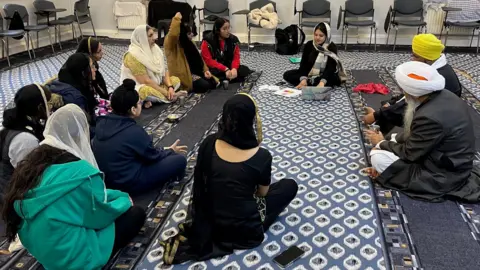 Dave Edwards/BBC
Dave Edwards/BBC"Our South Asian diet is a high-carb diet and actually high sugar as well," says Shanaz Begum.
"People struggle to eat healthily and to know what healthy eating is.
"That chapati, how much sugar has it got? You wouldn't think it's got that much sugar in it, but it actually has."
Ms Begum is a former NHS employee who gives up some of her free time to volunteer at sessions on healthy eating and weight management in Bradford.
She helps to run a free 12-week course, funded by Bradford Council, focusing on South Asian communities.
Course organisers say those communities face particular challenges when it comes to their health, diet and lifestyle.
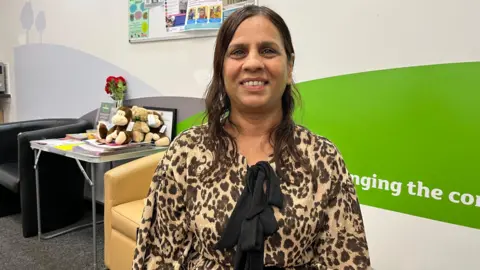 Dave Edwards/BBC
Dave Edwards/BBCAt today's session, those attending sit and chat enthusiastically as they discuss the merits - or otherwise - of various cooking oils.
Participants learn about the nutritional values of a range of foods, from South Asian staples to traditional breakfast cereals, as well as sharing recipes and cooking ideas.
Each session ends with 10 minutes of exercise.
Sampada Maheshwari, project lead, says: "South Asians tend to gather their fat around the visceral organs, around the waist, so their BMI [Body Mass Index] is slightly different.
"The festivals, eating patterns, cooking styles and traditional foods are different, so it is very important to focus on that population."
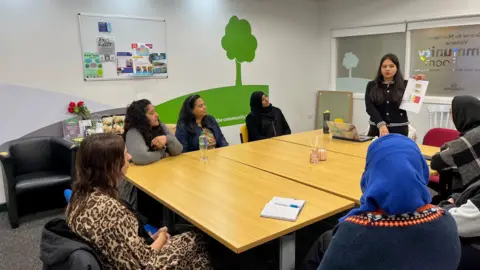 Dave Edwards/BBC
Dave Edwards/BBCBMI is used by the NHS to assess whether people are a healthy weight and is calculated by dividing a person's weight in kilograms by the square of their height in metres.
For white people, a BMI of 25 or higher is classed as overweight, but for people from black or Asian backgrounds, this figure is 23.
That means people of the same height and weight can be classed as "healthy" if they are white, but they can be considered "overweight" if they are black or Asian.
According to the NHS, this is because "people from an Asian, Black African, African-Caribbean or Middle Eastern ethnic background have a higher chance of developing health problems at a lower BMI".
Dietician Nusrat Kausar, based in Bradford, says her home city provides its own challenges when it comes to staying healthy.
"In Bradford, there are a lot of takeaways," she says, with a rueful smile.
"We have a lot of food shops, streets and streets of desserts, fried food.
"So, a lot of the environment doesn't make it easy to eat healthily."
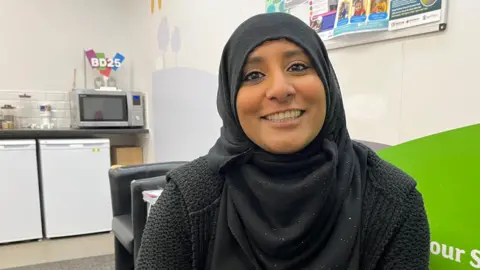 Dave Edwards/BBC
Dave Edwards/BBCBimla Devi, who has recently started attending the sessions in Bradford along with her daughter and a friend, says there were good reasons for getting involved.
"In the past, I was pre-diabetic," she explains.
"I've gained weight again and had to go to the doctors. That's how I found out about this."
Ms Devi says she thought the free sessions in Bradford were "new and different" compared to other weight-loss programmes.
"So, I thought I'd give it a go and, hopefully, it'll help my health and help my daughter and my friend as well."
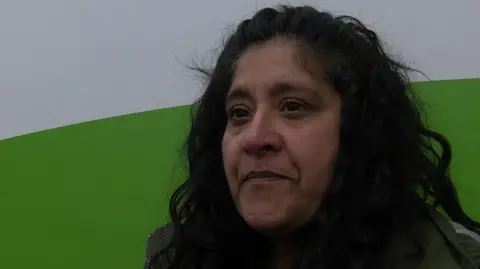 Dave Edwards/BBC
Dave Edwards/BBCMeanwhile, fellow participant Gurdev Kaur says the course will "definitely" make her and her family healthier.
"It makes you more aware," she says.
"You look at the labels, you talk about exercise, you talk about well-being and you just learn from each other so much.
"As a Sikh, your life journey is to learn things every day."
Ms Begum says the courses taking place in Bradford are all about "sharing".
"People are sharing their journeys, their recipes, what changes they're making and people are adapting it to their lifestyles as well. That is really powerful.
"This kind of group, it motivates people. I've seen the difference, I've learned from others, which has been brilliant, actually."
Listen to highlights from West Yorkshire on BBC Sounds, catch up with the latest episode of Look North.
